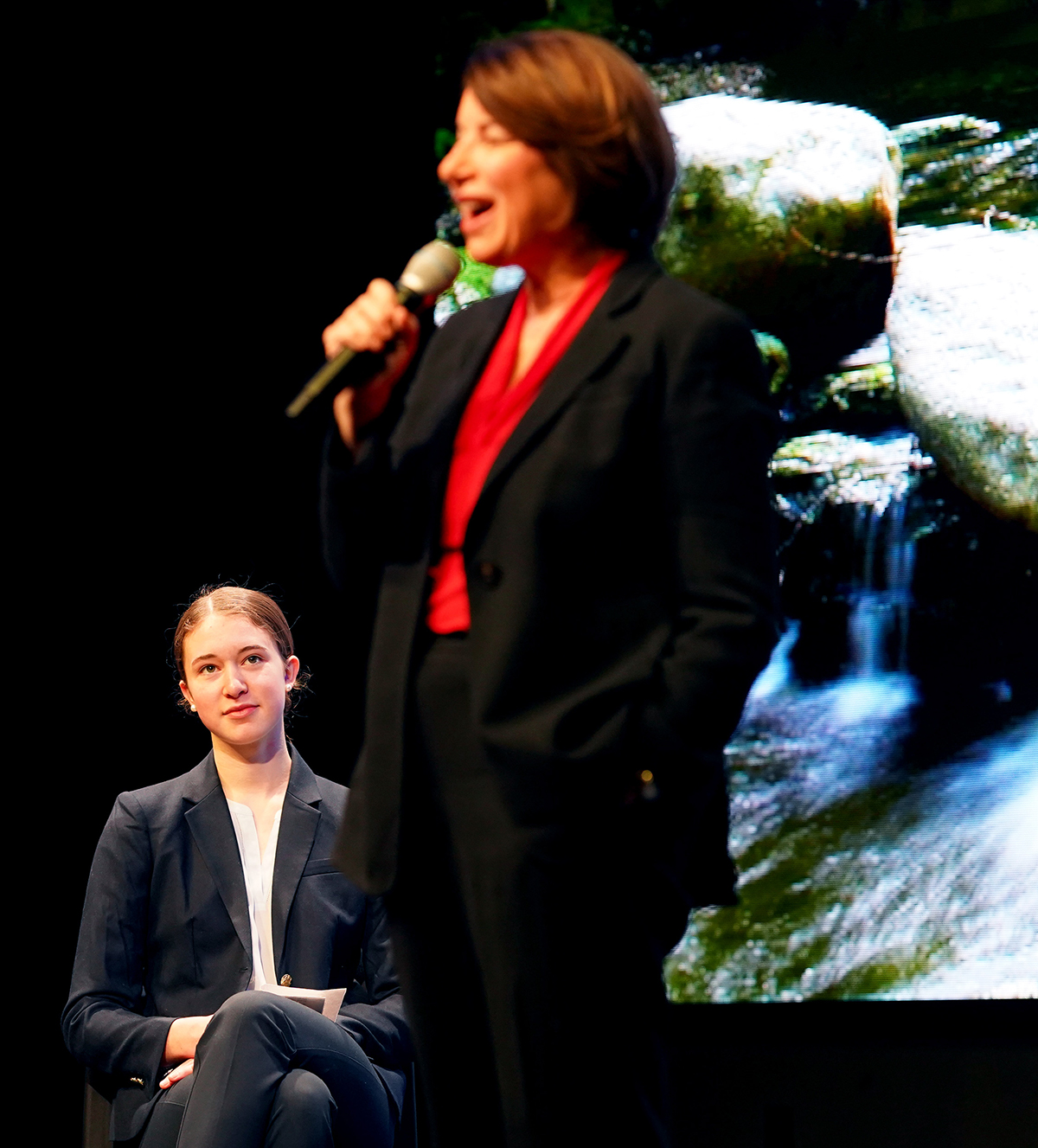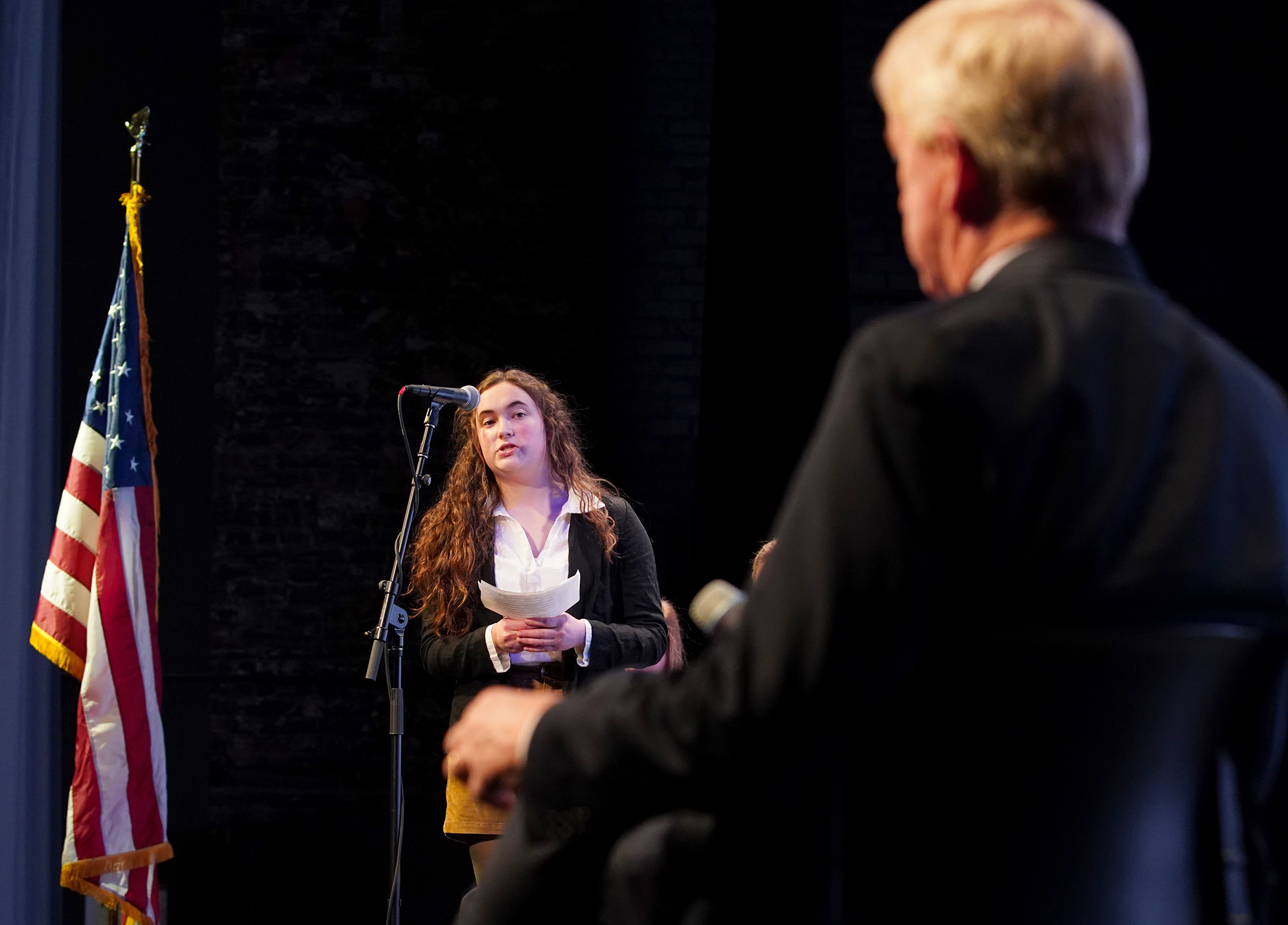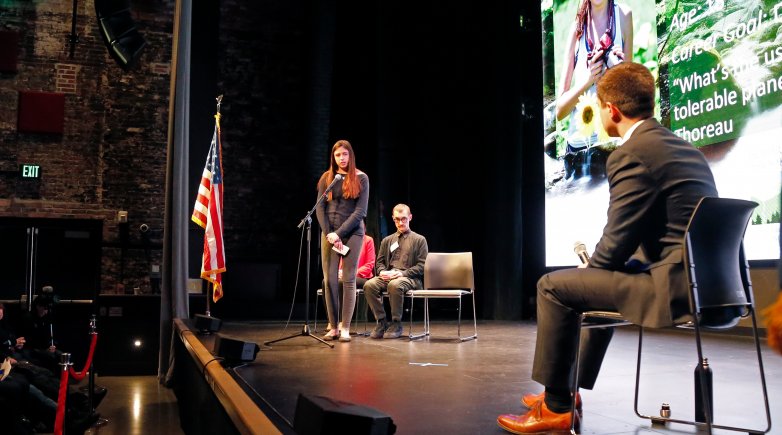Hot topic: Exonians query candidates about climate
Saskia Braden '20, Bea Burack '21 and Sadie DiCarlo '21 represent Exeter at a forum on environmental issues.
Saskia Braden '20 asks Pete Buttigieg, mayor of South Bend, Indiana, and Democratic candidate for president, a question during the New Hampshire Youth Climate and Clean Energy Town Hall in Concord, N.H.
Hundreds of New Hampshire voters crowded into a Concord concert hall Wednesday to hear from eight presidential hopefuls or their surrogates on the issues of climate change and clean energy.
The first drop-the-mic moment, however, belonged to a 16-year-old.
“My last question for you refers to hope,” began Beatrice Burack ’21 as she ticked off examples of climate change’s devastating impacts across the country. “In the face of bleak prospects like those, it’s easy to lose hope.
“My question for you today is, how will you inspire Americans who have given up hope in our nation’s ability to tackle the climate crisis, and how will you yourself remain hopeful when things get tough?”
The recipient of the question, Sen. Amy Klobuchar, a Democrat from Minnesota, smiled wryly, turned to the crowd and said, “These are literally, and I’m not just saying this to suck up, these are the best questions that I’ve ever had at a forum.”
Burack joined fellow Exeter students Saskia Braden ’20 and Sadie DiCarlo ’21 and several area college students as panelists at the New Hampshire Youth Climate and Clean Energy Town Hall. Six days ahead of the New Hampshire primary, Klobuchar; South Bend, Indiana, Mayor Pete Buttigieg; former Massachusetts governors Bill Weld and Deval Patrick, and businessmen Andrew Yang and Tom Steyer — each a PEA alumnus — fielded questions about their policies and philosophies for what many in the audience consider to be the most pressing issue of the age.

Burack’s question concluded the first of eight 45-minute question-and-answer sessions with the candidates. Braden sat on a panel that questioned Buttigieg; DiCarlo queried Weld.
Klobuchar immediately left to Washington, D.C., to vote on articles of impeachment of President Donald Trump, but not before she declared Burack’s question about hope as “the critical question for this election. … We lost an election in 2016, but we didn’t lose hope.”
Afterward, Burack reflected on sharing the stage with a would-be president and about her own feelings of hope — and despair.
“It’s definitely something I struggle with,” she said. “I try to remain hopeful, but it’s tough when you look at our government today and we’re not seeing a lot of progress.”
Burack, a resident of Hopkinton, New Hampshire, is one of the founders of Exeter Climate Lobby. The club’s goal is to empower students to fight for meaningful climate solutions in their communities and regional governments. Last fall, during club sign-up night, she said a classmate captured the resignation many Exonians feel on the topic of climate change.
“He said, ‘We’re screwed either way,’” Burack recalled.
“I think that’s the sentiment a lot of people have and, frankly, given what’s going on right now, it’s partially justified.”
DiCarlo, a junior from Exeter whose father, Jim, is a longtime teacher in the Science Department, asked Weld about how he would incentivize and help people pay for making substantive but often costly changes toward sustainability. She later told the candidate about how she and some Exeter classmates fought to get the Trustees to divest the Academy’s financial interests in the fossil fuel industry.
“It’s scary to realize how great an influence those industries have on our lives and how little influence we have on them,” she said to a roomful of agreeing nods.

Braden, a senior from Potomac, Maryland, quizzed Buttigieg about how he would help poor communities affected the most by environmental crises like lead in public drinking water and about what makes him the most qualified candidate to bridge the partisan divide over climate change.
She later said that climate education is the first step toward building resolve around environmental causes — on campus and beyond.
“In general, people are very passionate once they know about the issue. There’s a surprising number of people who don’t know very much about the science of climate change and don’t know much about how it impacts so many other areas of their lives.”
Braden said that, while we’ve made strides, she thinks Exonians’ climate literacy “could be better." She said she believes strongly that the topic should be a mandatory part of Exeter’s curriculum.
“If PEA wants to prepare us for the future to be leaders in whichever field we’re in,” she said, “we need to know about climate change and we need to know what we can do about it.”
